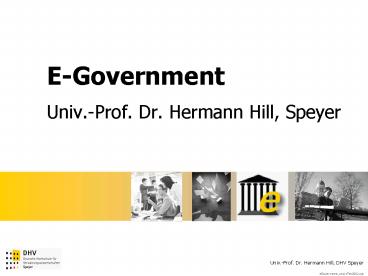EGovernment PowerPoint PPT Presentation
1 / 15
Title: EGovernment
1
E-Government
- Univ.-Prof. Dr. Hermann Hill, Speyer
2
Imagine a future
- in which citizens can log onto one Internet site,
easily find the government services they are
looking for, and use that site to conduct an
online transaction - in which businesses fill out one Internet form
for all their local, state, and federal
environmental regulatory compliance requirements - in which government officials make all purchases
and payments electronically, saving millions of
dollars.
Progressive Policy Institute, March
2000Washington D.C.
3
Government in the Information Age
- Deliver electronic and integrated public sevices
- Bridge the digital divide
- Achieve lifelong learning
- Rebuild their customer relationship (personalized
services)
- Foster economic development (being local, acting
worldwide) - Establish sensible policies and regulations
(develop trust, protect data privacy) - Create a more participative form of government
Microsoft E-Government StrategyMarch 2001,
Seattle
4
E-government for democracy development
- ICTs bring about major changes in the content of
work and administrative organisation, making
them better matched to citizen's needs. Greater
information-sharing at all levels of government
could make some hierarchical relationships
unnecessary. - A number of speakers stressed that, through
their ability to spread accurate and
comprehensive information, to automate processes
and to provide a record of transactions, ICTs can
be a powerful tool for good governance.
Third Global Forum on GovernanceMarch 2001,
Neaples/Italy
5
eGovernment indicators for benchmarking -
eEuropePublic Services for Citizens
- Income taxes declaration, notification of
assessment - Job search services by labour offices
- Social security contributions (3 out of the
following 4 unemployment benefits, child
allowances, medical costs, student grants) - Personal documents (passport, driver's licence)
- Car registration
- Application for building permission
- Declaration to the police(e.g. in case of theft)
- Public libraries (availability of catalogues,
search tools) - Certificates (birth and marriage) requests and
delivery - Enrolment in higher education / university
- Announcement of moving (change of address)
- Health related services (interactive advice on
the availability of services in different
hospitalsappointments for hospitals)
February 2001
6
eGovernment indicators for benchmarking -
eEuropePublic Services for Businesses
- Social contribution for employees
- Corporation tax declaration, notification
- VAT declaration, notification
- Registration of a new company
- Submission of data to statistical offices
- Customs declarations
- Environment-related permits (incl. reporting)
- Public procurement
February 2001
7
Speyerer Definition Electronic Government(von
Lucke/Reinermann)
- Abwicklung geschäftlicher Prozesse im
Zusammenhang mit Regieren und Verwalten
(Government) mit Hilfe von Informations- und
Kommunikationstechniken über elektronische
Medien.
- E-Information E-Communication E-Forms
E-Transactions - E-Commerce E-Service
E-Workflow E-Democracy
- E-Benefit
http//foev.dhv-speyer.de/ruvii/SP-EGov.pdf
8
Chancen von Electronic Government
- Außenperspektive (Bürger, Unternehmen)
- Reorganisationsperspektive (ausgehend von
Geschäftsprozessen) - Perspektive der Telekooperation (ortsunabhängige
Zusammenarbeit) - Wissensperspektive (effektive Gestaltung des
Umgangs mit Wissen in Köpfen und Akten)
Memorandum Electronic GovernmentGes. f.
Informatik, September 2000
9
Bund Online 2005
Kanzler-Initiative Bis 2005 alle
internetfähigen Dienst- leistungen des Bundes
online verfügbar
Stufe 3 Erschließung über Nachfragesituatione
n alle internetfähigen DL online
Stufe 2 Erschließung über Zuständigkeiten
Bereitstellung von "Muster"-Dienstleistungen
Stufe 1 Erschließung über Suchmaschine
redaktionell aufbereitete Kataloge
www.bundonline2005.de
10
Electronic Government
- Einheitliches Angebot, gemeinsame Portale
- Einheitlicher, wahlweiser, bedienungsfreundlicher
Zugang - Konvergenz durch technisch vermittelte
Kooperation - Modulares Design, prozesshafte Verknüpfung
- Aktualisierbare, relevanzorientierte Wissensräume
- Integrierbarkeit in verschiedene Kontexte
- Rückmeldung über erfolgte Operationen
11
Electronic Government verändert Verwaltungen
- Beliebiger Einstieg, online-Zugang
- Vernetztheit
- Lebenslagen statt Fachprinzip
- Informationsfreiheit
- öff./private Kooperationen
- Internetfähigkeit von Verwaltungsleistungen
- Europäisches Benchmarking
- Verwaltungsverfahren
- Hierarchie
- Ressortprinzip/Zuständigk.
- Arbeitsweise/Doku-Man.
- Identifizierbarkeit d. Staates
- Rechtsstrukturen
- Harmonisierung, Annäherung
12
Decision making in the knowledge administration
- Info auf Dienstweg vorgelegt
- Infosequenzen (Akte)
- amtliche, Referenz-Informationen
- interne Informationen
- Authentizität, bleibende Auffindbarkeit
- vorgeschriebenes Entscheidungsverfahren
- Info von allen Seiten
- InfoModule, InfoRäume
- unsichere, bewertungs-bedürftige Informationen
- offene, frei zugängliche Infos
- Flüchtigkeit durch ständige Veränderung,
Aktualisierung - prozesshaft zu entwickelnde Entscheidung
13
Wandel der Verwaltung
- Wandel durch E-Government
- Dezentralisierung / Demokratisierung des Wissens
- Nutzung neuer Techniken
- Online-Zugang für Bürger
- Informationsfreiheits-gesetze
14
Renaissance der Persönlichkeit Akteurzentrierter
Ansatz
- New Public Management
- Electronic Government
- Aktivierender Staat
15
Kontakt
- Univ.-Prof. Dr. Hermann Hill
- DHV Speyer
- Projekt Neue Medien in der Bildung - PUBLIC
POLICY - Tel. 49 (0) 6232 / 654-328
- E-Mail hill_at_dhv-speyer.de
- WWW http//www.dhv-speyer.de/hill

